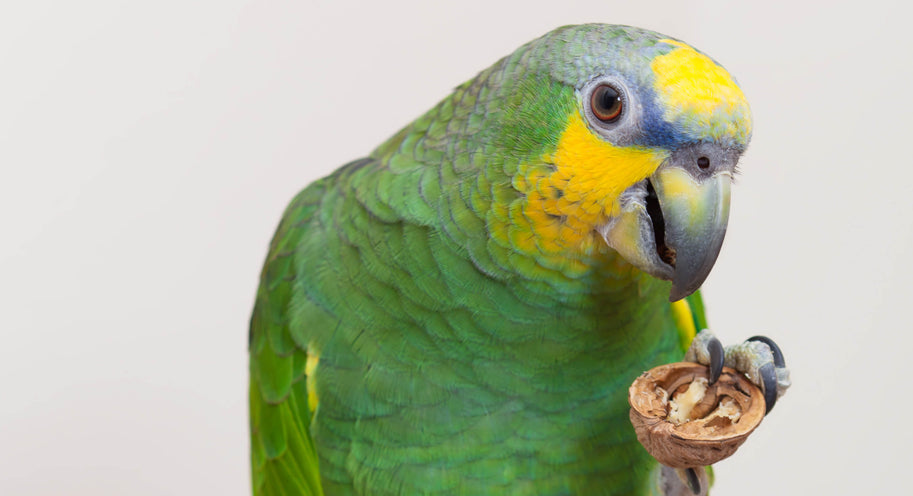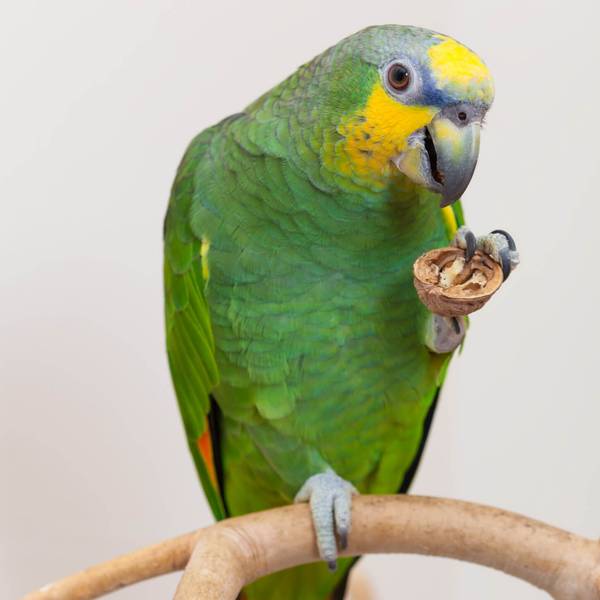Being a bird owner requires you to have an understanding of their unique needs to keep them happy and healthy. There are thousands of species of birds and no one diet can be used for all of them, but one of the most basic needs of a happy and healthy bird is a well-planned and a complete nutritious diet, but depending on which species of pet bird you own, birds require a variety of food sources in their diet to thrive and live a long, happy, and healthy life.
Diet
Diet can have a direct effect on the lifespan of your pet bird with vitamin and mineral deficiencies and a host of other health problems commonly seen in birds that are fed inadequate diets.
When it comes to our feathery friends, we first think of ‘bird seed’ as a source of food. A seed only based diet is not a complete and balanced diet. Seed mixes can contain a lot of fat and carbohydrates, and your bird will often pick out the seeds they like best leaving a lot of waste. Too much of this can lead to obesity, fatty liver, malnutrition, overgrown beaks and nails, and a range of other health issues.
Variety is key!
Your pet birds’ diet should be initially based around what they would eat in the wild, then adapted to domestic pet life. A good diet will provide for them nutritionally, mentally stimulate them and work their beak and bodies. High quality bird seed such as Forage Gourmet Seeds or pelleted diets should make up about 70% of your bird’s diet with the remainder consisting of fresh fruits and vegetables. It should consist of a formulated small, medium, or large parrot diet and supplemented with vegetables, herbs, seeding grasses and native foliage.
Our good friends at Forage Gourmet Seeds believe that ‘all birds are instinctive foragers, who naturally spend their time searching and foraging their environment for their nutritional needs.
This activity naturally encourages birds in the wild to interact with their environment, offering stimulation and exercise as well as providing a wholesome and balanced diet’.
And as such, created a menu that offers stimulation and interaction with the food by allowing birds to search for different natural ingredients.
This interaction with the food, or foraging, is not only designed to provide a balanced, healthy and natural food source for our birds, but to also encourage our birds to instinctively behave with their food as they would in the wild.
By using only natural 100% human grade ingredients, including fruit, nuts, seeds, grains and herbs, Forage have developed a menu that reduces food waste by only using ingredients that are specific to certain species, as well as incorporating foods that are found in nature to assist bird vitality and to optimise bird stimulation.
Treats
Treat such as millet spray, sunflower seeds, and dried fruit can be used as special rewards or training treats during play time! Vegetables such as spinach, Asian greens, broccoli, peas, carrot, and herbs such as mint, basil, parsley, and rocket are all safe for your bird to eat. It’s a great idea to have cuttlefish, grit, and an iodine/mineral block.
Cuttlefish is an excellent source of calcium that will help keep your bird’s beak nice and trim. The mineral block/iodine will prevent the onset of goitre (an iodine deficiency) and provide essential nutrients for your bird. Grit is essential in aiding their food digestion.
If your bird refuses to eat and try new foods, it’s important to provide a daily vitamin supplement and try to offer hand-rearing food along with the seed/pellets. Ensure fresh clean water is always available at a temperature and quality that meets the birds’ physiological needs and that the bird will happily drink. Water should be changed daily, and water containers cleaned regularly to remove any slime build up.
The digestive system of birds is very easily upset. Any slight amount of stress can cause a reduction in the blood supply to the gut. They require beneficial digestive bacteria to keep the bad bugs under control and to ensure that as much of the food as possible is absorbed into the bloodstream. Avian probiotics support stress management and may boost your bird’s immunity and cultivate colonies of healthy bacteria along the digestive tract.
During the vulnerable moulting stage, you should give your bird food that is rich in essential nutrients as growing new feathers takes up a lot of their energy. Among other things, feathers are made up of keratin, which primarily consists of sulphur containing amino acids. The food should also include quality proteins, mineral salts, sulphur containing amino acids, calcium, and vitamins, all of which can be found in quality supplements from your local Just For Pets store.
Things to Remember:
- The main diet problem seen in pet birds is Vitamin A deficiency, from having an only-seed diet. This can lead to many diseases commonly seen in pet birds.
- Calcium is very important to birds as it is crucial for brain function and inadequate amounts can lead to both physical and behavioural problems. Young birds require plenty of calcium for strong bone formation and nerve and muscle function.
- Grit and fresh water must be always made available
- Always watch to see if your birds are eating daily. A sick bird will often stop eating but will stay at the food bowl so be sure to observe your bird.
- Introduce new foods gradually as birds fail to recognise new foods as something they can eat, and always place new foods where they would normally eat and expect to find food.
- Feather plucking, fear and aggression are common symptoms of calcium deficiency
- Birds have very different food requirements when breeding and when feeding their young, moulting, and especially during growth as a young bird, so be sure to be across this to avoid complications during these times.
- Never feed your bird avocado, onion, rhubarb, garlic or chocolate as these can be toxic and potentially fatal to birds.






